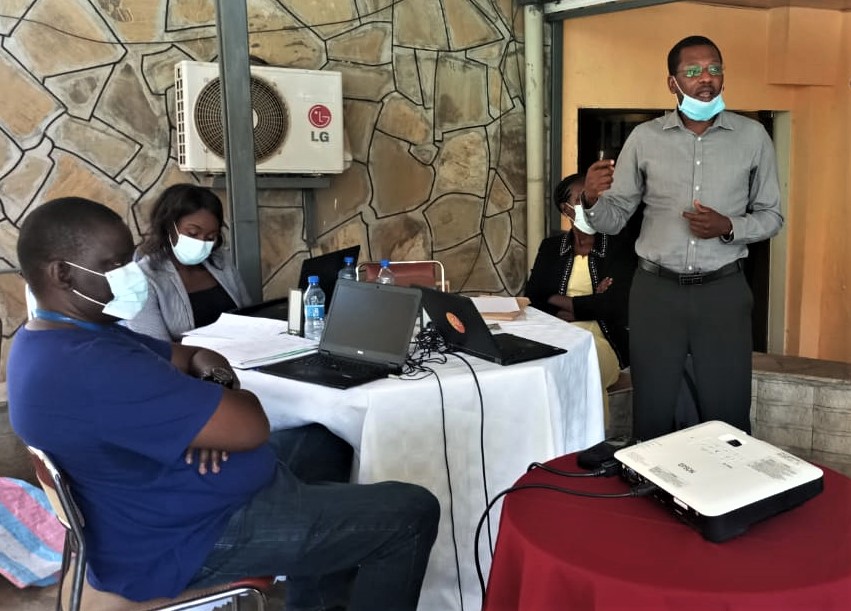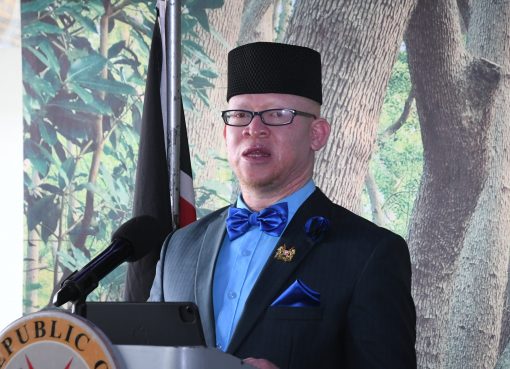Respective Governments and global partners should urgently boost funding for medical research if they hope to save the human race from the novel coronavirus.
This noble idea faces a serious threat as coronavirus (COVID – 19) millionaires have literally translated the saying “when life gives you lemons, make lemonade”, as they laughed all the way to the bank even as families bereaved by the pandemic buried their relatives six feet under.
Perhaps the remarks by Kenya Medical Research Institute (KEMRI/CDC), Kisumu Centre Branch Chief, HIV Researcher Dr Victor Mudhune succinctly puts it that this is why “we require more resources (funds) that is hard to access from governments and global partners”.
Dr. Mudhune said that it was disheartening to see a few unscrupulous people diverting the scarce funding into their pockets were tantamount to genocide (mass killing) as witnessed in the neighboring Somalia, Southern Sudan, Rwanda, Iran, and Iraq.
He appealed to respective governments and global partners including the World Health Organization (WHO) to spearhead the public desire to see a streamlined disbursement of funds and procurement processes.
The medic pointed out during a media science café organized by the Media for Environment, Science, and Agriculture (MESHA) for journalists drawn from the lakeside city held at a Kisumu hotel last week.
Dr. Mudhune confided that KEMRI, Kisumu had the testing capacity standing at 2000 samples per day. A local daily had also reported that Kenya has overcome a major bottleneck in mass testing for coronavirus attributed to the research institution’s innovativeness.
Subsequently, diseases that in the past brought Kenya to its knees over the last decade such as; Tuberculosis (TB), HIV/AIDS, Avian flu contributed to the breakthrough, a feat that has immensely helped in the current mass testing for COVID – 19 samples.
The state of the art machine will see KEMRI testing at the time of installation of the innovation which stood at 600 tests per day was projected to see Kenya process and get results for at least 35, 000 samples in just 24 hours thus marked a major achievement in the Health sector.
The innovation will see Kenya use the Cobas 6800 or the 8800 HIV viral load machines and the GeneXpert use for point of care testing for TB, according to Prof. Matilu Mwau who at the time was the Busia, KEMRI Director. The Cobas machines are located in seven centers including Busia, Kisumu, Kilifi, Nairobi, Mombasa, Eldoret and several private hospitals.
The daily quoted a GeneXpert Coordinator Jeremiah Okari who disclosed during an interview at the time that the machines were especially efficient at detecting pulmonary TB, a respiratory illness like COVID – 19.
It emerged at the time that for the machines to switch from HIV and TB tests to VOVID – 19, the government through Kenya Medical Supplies Authority (KEMSA) was set to order 100, 000 special kits from Switzerland with support from the WHO Emergency Response Centre and the World Bank.
According to Dr. Mudhune, KEMRI Kisumu can do 1000 tests in a shift of 8 hours and so the urgent need for the government and partners in the Health sector to consider allocating more resources. “Is the healthcare sector in Kenya overwhelmed? He posed, arguing that there was no need to keep those suspected/infected by COVID – 19 in quarantine centers.
He vouched for Home-Based Care instead of admitting that HIV services in the various facilities have been temporarily disrupted but this should not make our clients (patients) fail to turn up at designated hospitals for treatment or collection of ARVs.
He said that at KEMRI Kisumu they conducted the tests in turns; for example, they conducted HIV testing during the day while handling COVID – 19 tests at night. On flattening the curve; Dr. Mudhune simply stated; 1. Wear a face mask, 2. Hand washing and 3. Keep social distance.
Dr. Mudhune revealed that there are 5 candidate vaccines which are promising and are already in the 3rd (III) phase of evaluation. These are in relation to fighting against the COVID – 19.
According to the WHO, 172 economies are now engaged in discussions to potentially participate in COVAX, a global initiative aimed at working with vaccine manufacturers to provide countries worldwide equitable access to safe and effective vaccines, once they are licensed and approved. COVAX currently has the world’s largest and most diverse COVID – 19 vaccine portfolio. This comprises 9 candidate vaccines, with a further 9 under evaluation with conversations underway with other major producers.
“Equal access to COVID – 19 vaccine is the key to beating the virus and paving the way for recovery from the pandemic”, said Stefan Lofven, Prime Minister of Sweden, who added that “this cannot be a race with a few winners, and the COVAX facility is an important part of the solution – making sure all the countries can benefit from access to the world’s largest portfolio of candidates, fair and equitable distribution of vaccine doses”.
So far the Coalition for Epidemic Preparedness Innovations (CEPI) which is leading COVAX vaccine research and development work, which aims to develop three safe and effective vaccines which can be made available to countries participating in the COVAX facility. Nine candidates are currently being supported by CEPI, seven of which are currently in clinical trials.
Governments, vaccine manufacturers, organizations and individuals have committed US$ 1.4 billion (Kshs. 140 billion) towards vaccine Research & Development (R&D) so far but an additional US$ 1 billion (Kshs.100 billion) is urgently needed to continue to move the portfolio forward.
The goal of COVAX is that by the end of 2021 to deliver 2 billion doses of safe, effective vaccines that will have passed regulatory approval and/or WHO prequalification. The vaccines will be offered equally to all participating countries, proportional to their populations, initially prioritizing healthcare workers then expanding to cover vulnerable groups, such as the elderly and those with pre-existing conditions.
Further doses will then be made available based on country need, vulnerability, and COVID – 19 threat. The COVAX Facility will also maintain a buffer of doses for emergency and humanitarian use, including dealing with severe outbreaks before they spiral out of control.
As of August 14, 2020, the confirmed cases of COVID – 19 globally stood at 21, 010, 700 with 13, 047, 560 people have recovered from the pandemic but 761, 260 succumbed to the coronavirus. This number could be higher by the time of penning this article and so the more reason why everything should be done to curb the rising deaths. Boosting research is one area.
By Joseph Ouma




